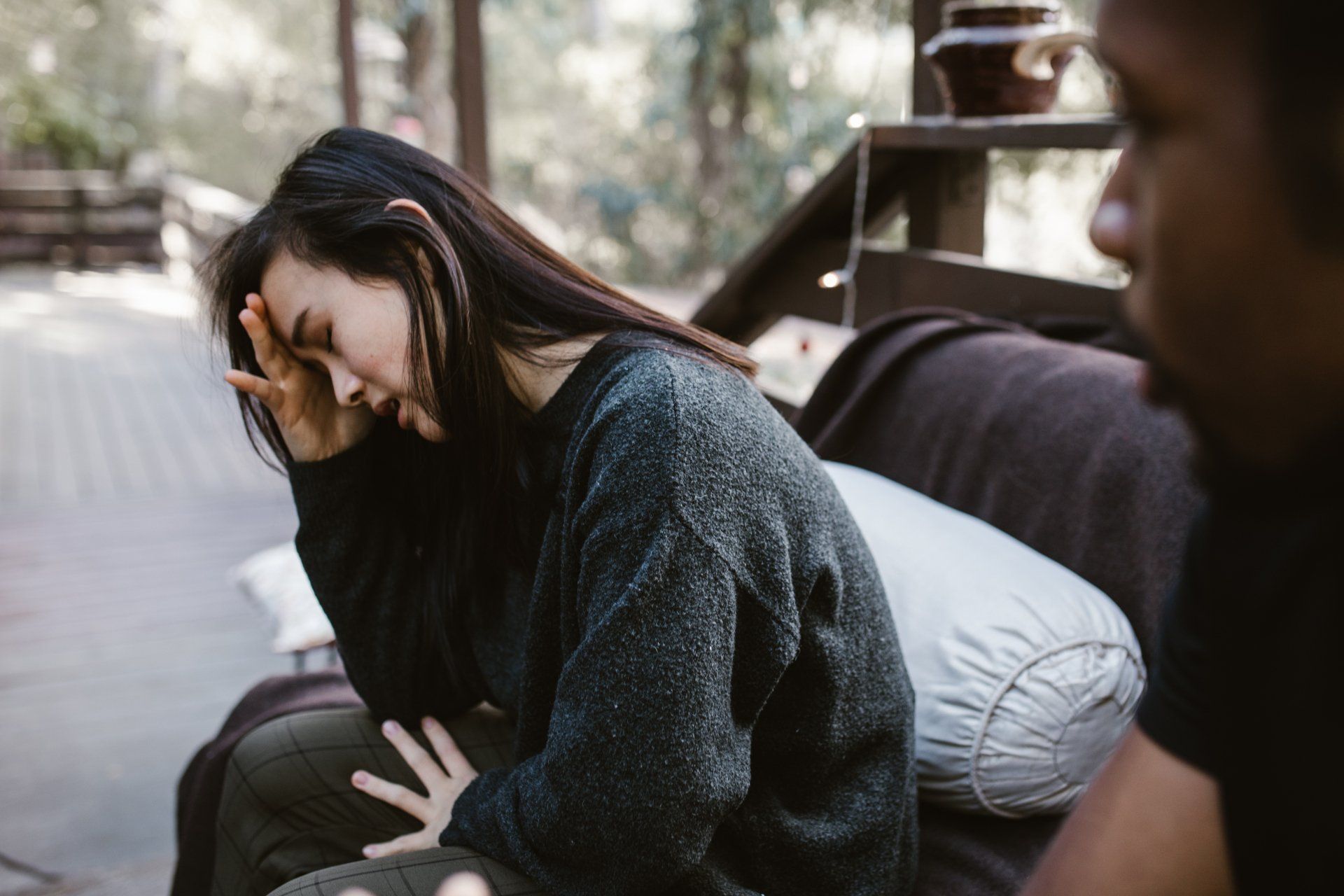Reading time: 12 mins
As you consider telling someone you love about your experiences with binge eating, questions often come up like “how should I tell them?”, “When’s the right time?” and “What do they need to know?”. This is why I created my guide
“How do I tell someone I love about my binge eating?” Part 1
where we look at how to have this often vulnerable and difficult conversation.
But other types of questions also come up; the more nagging questions like “how will they take it?”, “Will they think of me differently?” and “Will it affect our relationship?”. Of course, everyone’s relationship is different and we each have our own ways of dealing with challenges, not to mention ideas about
what binge eating actually is.
Even so, I thought it would be helpful to give you another perspective and ask my ex-partner and now close friend Mark some questions about his experience when I told him about my own bingeing. At this time we had been together for about 8 years (we went on to be together for over 12 years) and I had been bingeing for at least 10 years.
This is an incredibly open and oftentimes vulnerable conversation and it’s taken a lot from us to be able to put it into the world. However, we both feel these are some of the most important insights we’ll ever share and know they’ll help many people. It had to be done!
We’re coming at this interview from the perspective of those who were in a romantic partnership, but lots of what we share can be applied to other types of relationships too, like close friends and family. We hope this will help you to feel more reassured about bringing up the subject with your own loved one, and have a more positive and productive conversation…
Lucy: "From what we both remember, I gave you some glimpses of insight into how insecure I felt about my body and my strained relationship with food from 2-3 years into our relationship. However, it wasn’t until 8 years in that I explicitly told you about my full experiences with binge eating.
You remember more about that day than I do, so can you set the scene, please?"
Mark:
Some context for the reader: at this point in time Lucy and I were living in London, in houses about 10 minutes walk from each other. We’d recently spent 5 months together travelling around South-East Asia and were now working on our own business projects from home during most daytimes. We frequently met up on benches in front of the docks near Lucy’s house to have a chat and spend a bit of quality time together.
"I still can picture everything about it so vividly.
On that day, I had a clear sense that you were very nervous, and you quickly broke into telling me that you had a problem with binge eating. I’ll leave out my emotions and reactions for this question, as that’s a whole topic in itself, and will focus on what you said and how you said it.
You told me in full detail the extent of what your binge eating routines were. About often going to the supermarket twice a day, despite having not much money at all, and buying a shocking amount of junk food and consuming it in a single sitting after each of those shopping trips.
You then described how you’d started binge eating in your teens when you went to the shop at break times, and also mentioned that you’d been bulimic for roughly a year in your early twenties.
From almost immediately after the beginning of the conversation you were crying. It didn’t feel right to invade your space while you were telling me something so important, but as soon as you’d finished I put my arm around your shoulders and we cuddled up as I replied.
People were walking past throughout (it’s a reasonably popular area for walks) but I vividly remember not caring about them at all. I’m sure you were the same."
Lucy: "What did you know about binge eating and binge eating disorder at the time, if anything?"
Mark: "Next to nothing. Just some stories on the news about the occasional famous person (e.g. I think Princess Diana said she had been bulimic at some point), and there was nothing practically useful in those stories - just gossip or sensationalism."
Lucy: "What do you think I did well when I told you about my experiences?"
Mark: "I’m not sure whether you were holding anything back, but it certainly seemed like you were being very open - I was pleased (though sad) and proud of you for that, and still feel that way now. You weren’t afraid to say things that probably felt embarrassing, like the amount of food and money involved in your binges. Again, I was and am very proud of you for that.
It was good to hear as much detail as possible - I just wanted to understand. Partly to be able to empathise with you, and partly to hopefully be able to help and be supportive in the future. You held yourself together very well, which helped you to be coherent and convey the message in an effective way."
Lucy: "I’ve grown a lot since then and I’m sure I would do things differently now. What do you think I could have done to help you understand me and what I needed better?"
Mark: "This is the hardest thing to share, but please be clear that I don’t mean it in a negative or blaming way. Also, there are plenty of things I would have done differently in hindsight, so I can hardly say this in a negative manner, only in a constructive, supportive and caring (though difficult) way of hopefully helping you, and helping others in similar situations…
If, somehow, we could go back in time and get you to change what you did, it would have been to tell me explicitly about your binge eating much, much earlier. As in, years earlier. I know you feel you partly did that after 2-3 years, but if you did attempt to do so then it was in such a way that I had zero idea that you actually meant binge eating.
We were in a partnership, and it could have made a big difference to helping you heal faster if we’d worked together on it from near the beginning with the actual core issue in mind. For example, I helped you to go to a counsellor for anxiety, but it turned out I was working in a direction that wasn’t getting to the core of your problems, even if it did help in some ways.
Also, given the significant impact on our sex life of your weight gain hitting your self-esteem and confidence, which eventually played a large part in our breakup (though that was totally amicable, for the record - to the readers of this!), not knowing the main reason for that weight gain - and your mental health challenges - until 8 years in meant it was almost impossible for us to fix it and change the direction our relationship had taken. I’m still sad about that, though there’s truly no blame or anger, I promise :) - I truly do understand why it was so difficult :)
It’s worth pointing out that my weight gain must have played a part too, despite your protestations to the contrary - which I feel bad about because I regard that behaviour by me as selfish, as opposed to you having a medical condition, which wasn’t your fault.
***With all this in mind, I would just plead with anyone suffering from binge eating to be open as much and as early as possible. Nice and caring people will understand***
A good way of thinking about things like this is that when you’re in a partnership it will work so much better when both sides understand the important things that are going on with the other person. Sometimes the partnership can’t work quite right when that knowledge isn’t there, which I think is one of the bigger things that happened to us.
But in terms of what you actually told me on the day, I think you did very well. You probably couldn’t have done much better, really! :)"
Lucy: "I would agree with that. It’s exhausting hiding binge eating from anyone, let alone the most important people in your life. I think at this point I felt utterly relieved, especially by the fact you received it all so well.
How has your understanding of binge eating changed since that time?"
Mark: "I didn’t realise how prevalent it is, or about the potential triggers. A shockingly high percentage of my female friends said they’d had troubles with binge eating after I told them about you (only after you’d made it public, not before, to be clear!) So my experience with you has made me more aware of binge eating and more empathetic toward people who suffer from it."
Lucy: "Thank you so much for sharing your perspective! I really appreciate it and I know this is going to help many people. Is there anything else you’d like to add?"
Mark: "Not really :) You asked very good questions and drew out all the key points :) As I always say: I am very proud of you for overcoming binge eating, and for everything you have done to help others with binge eating issues."
Mark has also kindly answered more questions in my guide
“Someone I love struggles with binge eating, how can I help them?” Part 2: an interview with my ex-partner. This interview is aimed towards someone whose loved one is struggling with binge eating but I do recommend that you read this one too, before sharing it with them.



